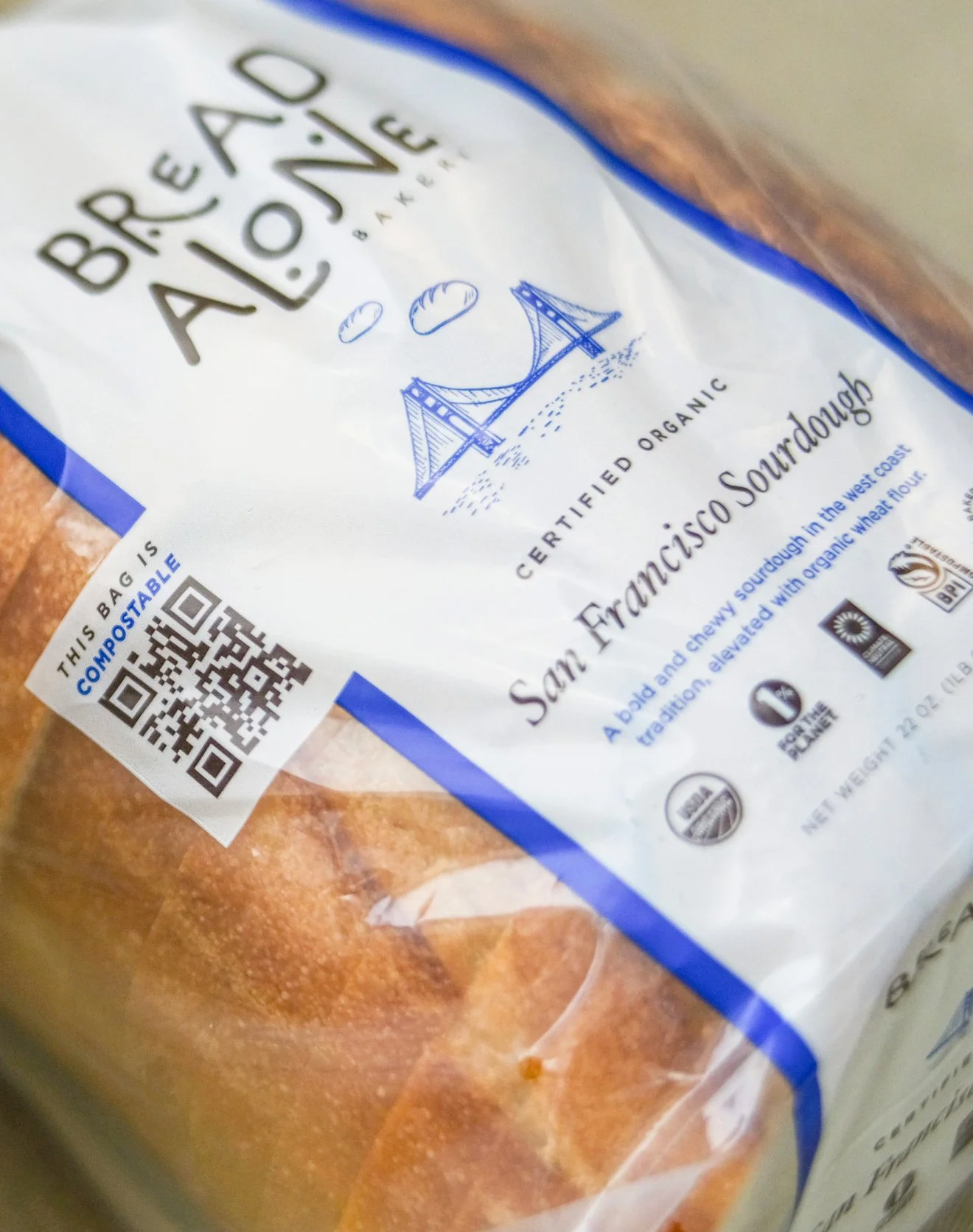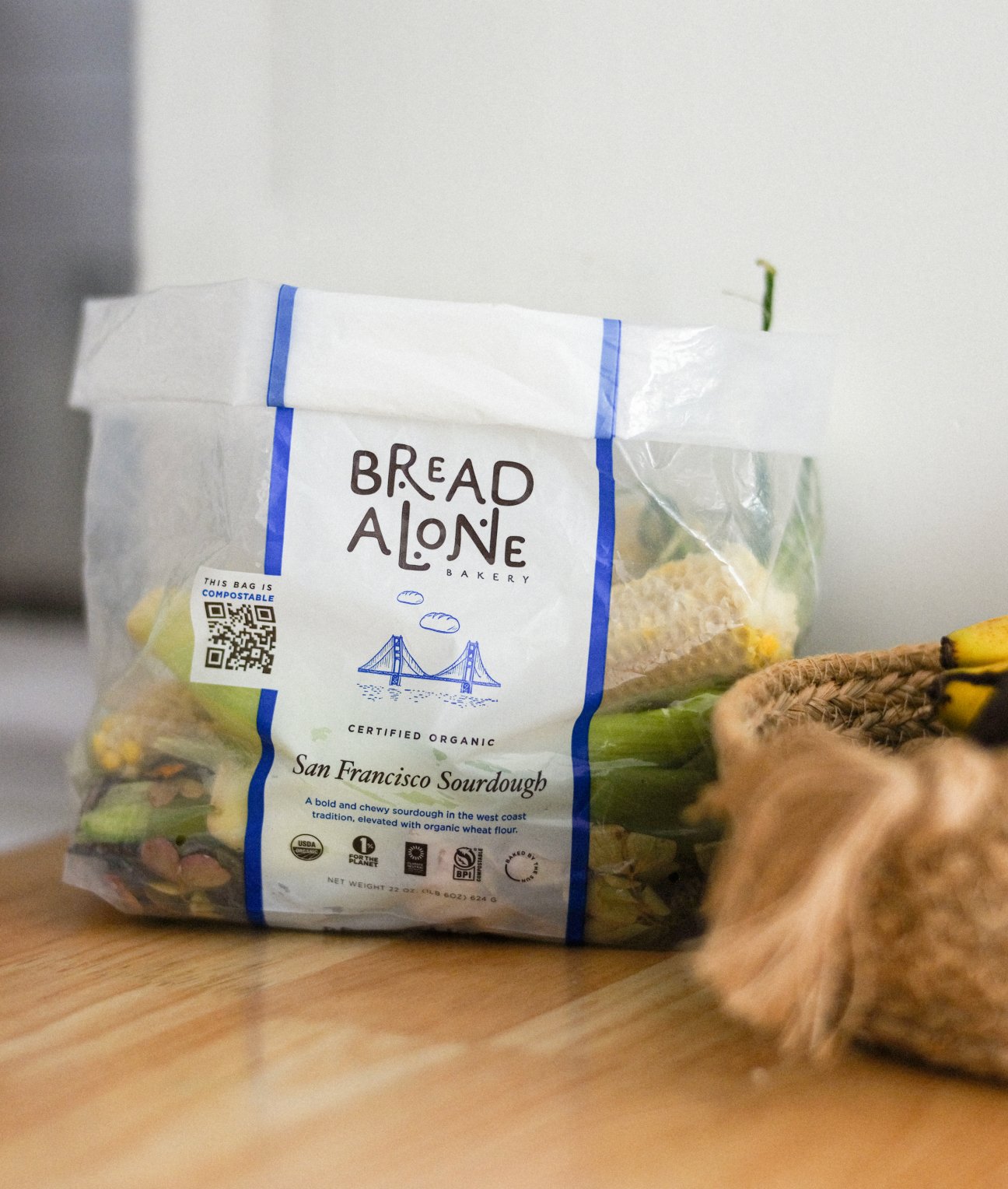Composting our packaging
Do you have a Bread Alone bag that says “this bag is compostable?” Exciting news! You can officially compost your BPI Certified Commercially Compostable bread bag through any commercial composting facility.
If you live in NYC, the brown and orange compost containers available at many residences can receive your compostable bread bag, as well as NYC Smart Compost Bins (find one in your neighborhood here). If you’re outside of NYC, check with your local composting program to see if they accept commercial composting or find a composting site here. If you don’t have access to commercial composting, this is a great time to speak up and advocate for a program with your local municipality.
Our suggestion
Use our compostable bag to collect your food scraps throughout the week (on your counter, in the fridge or in the freezer) and save on buying compostable bags for your weekly composting needs!
You can feel good knowing that your bread bag is not only skipping the landfill, but will be turned into earth-sustaining compost, which will enrich the soil where it is applied.
OUR COMPOSTABLE PACKAGING STORY
With our goal of lightening our load on planet earth, single-use plastic packaging is an important area we’re committed to improving. We aren’t going to sugarcoat it – moving beyond single-use plastic packaging is a challenging problem that needs to be addressed, and we’ve been working for years to come up with a solution.
This work has led us to a plant-based, BPI Certified Commercially Compostable bag that we’re introducing with select retail partners in geographies with widespread access to commercial composting facilities, such as NYC. Derived from biodegradable crops such as sugar cane, when properly composted, it becomes a nutrient-rich fertilizer that helps build soil health.
This is just the beginning of our journey to lessen the impact of our single-use packaging, and we commit to introducing more sustainable options over time. Thank you for your partnership in lessening our load on planet earth.
Some of the factors we’ve considered:
Our customers’ access to commercial composting services
Whether new packaging still preserves the freshness of our breads to prevent food waste
Testing the compostable packaging options with 3rd party certifiers
Understanding the effects of new packaging if it doesn’t end up in the best end-of-life scenario
The additional expense of sustainable packaging and how that will impact our bread’s affordability
FAQs
We know this is a lot of information, but we want to provide it all in the interest of helping the composting conversation for those who want to dive in! We are committed to being a part of building the infrastructure for compostable packaging, which includes informed consumers.
-
Composting is the decomposition of materials that come from animals and plants (our compostable packaging is made from plants). Through maintaining the right aeration and temperature as they break down, these materials become a rich organic matter and a natural fertilizer.
-
Composting is a delicate balance of heat and aeration to help the growth of beneficial microbes which break down organic matter. Common means of composting at home include: a worm bin, a compost turner, a compost pile, or a tabletop, residential composter (such as Lomi).
-
Right now, there is no U.S. certification for home composting. There is variability in approaches to composting, so it is difficult to come up with a standard certification. We applaud and encourage composting at home, but for now commercial composting is the only certified solution for our compostable packaging.
-
Commercial composting facilities are able to consistently maintain the proper conditions of aeration and heat required to nurture microorganisms that reliably break down compostable packaging and turn it into usable fertilizer.
-
We support all efforts to introduce more sustainable packaging options, but we believe compostable packaging is a step beyond biodegradable packaging. While biodegradable packaging breaks down in a landfill environment, compostable packaging (when composted) can become a nutrient-rich fertilizer and be circled back into the soil to enrich the next crop of plants. To us, the circularity of materials is an important benefit of compostability.
-
No, our compostable bags cannot be recycled through bag dropoff.
-
While we encourage all customers to seek out and use composting, we understand that it is not always possible and that composting infrastructure has a long way to go to be as accessible as garbage disposal. If you end up throwing away your compostable bag, it will biodegrade in a landfill but it will not become compost.



